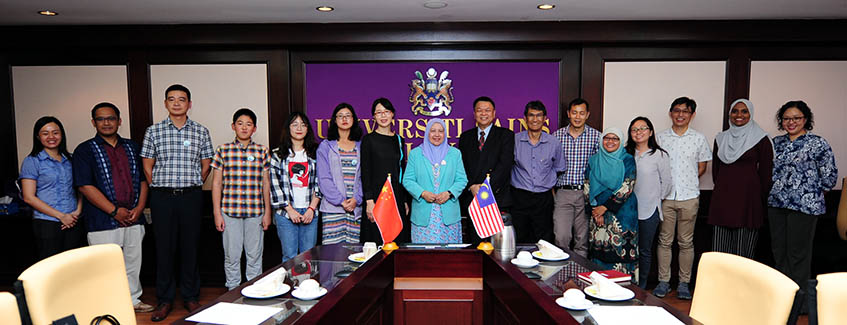BETTER RICE CLONE, HIGHER RICE YIELD, THANKS TO TECHNOLOGY TRANSFER

USM, PENANG, 26 January 2019 – Universiti Sains Malaysia (USM) has been identified to play a leading role in the CRISPR Rice Project, a research and innovation initiative involving technology transfer and knowledge sharing that would help produce better rice clone and higher rice yield.
Besides USM, other institutions/agencies involved in this joint partnership project are Nanjing Agricultural University (NAU), China; Malaysia Innovation Hub (MIH); University of Malaya (UM); Universiti Kebangsaan Malaysia (UKM) and Malaysian Agricultural Research and Development Institute (MARDI).
MIH Chief Executive Officer and Chairman, Vincent Wong Wai Sang said, due to USM’s location in the northern region neighbouring the main rice-producing state (Kedah) in the country, and having the related expertise, USM can play a major role in spearheading this project.
“It is hoped that through this project, a new rice clone can be derived from the research done on the local Indica rice, resulting in a higher yield and better income for our local farmers.
“This is also in line with the aim of our government to increase the nation’s self-sufficiency level (SSL) in rice production from the current 70% to 100%,” said Vincent Wong, when he brought the NAU delegates to pay a courtesy call on USM Vice-Chancellor, Professor Datuk Dr. Asma Ismail at the Vice-Chancellor’s office here recently.
He added that it is also in line with MIH’s mission in creating a conducive ecosystem to enable the academicians/researchers in the universities and the government agencies to link up and form synergies in conducting high impact research, development and innovation work.
Meanwhile, USM Vice-Chancellor welcomes such collaboration initiatives, as it is in tandem with USM’s aim of implementing innovative impactful research that would entail the transfer of technology and sharing of knowledge for the benefit of the society.
“We know that China uses a lot of innovations and technologies as the bedrock for the advances in its economy, and has been actively promoting technology transfer and knowledge sharing across the Belt and Road countries including Malaysia.
“As such we welcome the intention of Nanjing Agricultural University to work with the Malaysian universities including USM in this CRISPR technology transfer project,” added Asma.
During the meeting, Professor Dr. Xiaorong Fan from the NAU College of Resources and Environmental Sciences explained in detail her research work regarding increasing the efficiency of the nitrogen transport genes in padi plants to help increase the yield of rice.
Also present were the Director of Nexus (Science), Professor Dr. Mohd Nazalan Mohd Najimudin; Director of Research Creativity and Management Office (RCMO), Professor Dr. Lee Keat Teong; several USM Head of Departments and NAU researchers.
Prior to that, the entourage also met the researchers from the National Advanced IPv6 Centre (NAv6) to discuss the setting up of a remote sensing facility that will involve big data in Malaysia to be funded by the Chinese Government.
Nanjing Agricultural University (NAU) is located in Nanjing, Jiangsu province, China, and it is one of the earliest institutions of higher agricultural education in China and a national key university under the Chinese Ministry of Education.
Famously known for its established disciplines in Agricultural, Environmental and Life Sciences, NAU is ranked #9 in the Best Global Universities for Agricultural Sciences rankings, according to the U.S. News and World Report 2019.
Text: Tan Ewe Hoe
- Created on .
- Hits: 1709
